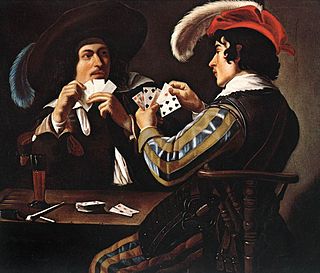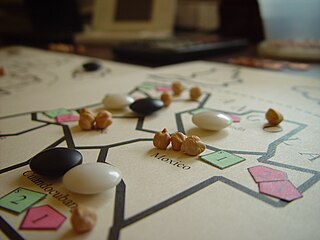
Blackjack is a casino banking game. It is the most widely played casino banking game in the world. It uses decks of 52 cards and descends from a global family of casino banking games known as "twenty-one". This family of card games also includes the European games vingt-et-un and pontoon, and the Russian game Ochko. Blackjack players do not compete against each other. The game is a comparing card game where each player competes against the dealer.

A card game is any game using playing cards as the primary device with which the game is played, be they traditional or game-specific. Countless card games exist, including families of related games. A small number of card games played with traditional decks have formally standardized rules with international tournaments being held, but most are folk games whose rules may vary by region, culture, location or from circle to circle.
An evolutionarily stable strategy (ESS) is a strategy that is impermeable when adopted by a population in adaptation to a specific environment, that is to say it cannot be displaced by an alternative strategy which may be novel or initially rare. Introduced by John Maynard Smith and George R. Price in 1972/3, it is an important concept in behavioural ecology, evolutionary psychology, mathematical game theory and economics, with applications in other fields such as anthropology, philosophy and political science.
Game theory is the study of mathematical models of strategic interactions among rational agents. It has applications in many fields of social science, used extensively in economics as well as in logic, systems science and computer science. Traditional game theory addressed two-person zero-sum games, in which a participant's gains or losses are exactly balanced by the losses and gains of the other participant. In the 21st century, game theory applies to a wider range of behavioral relations, and it is now an umbrella term for the science of logical decision making in humans, animals, as well as computers.
Minmax is a decision rule used in artificial intelligence, decision theory, game theory, statistics, and philosophy for minimizing the possible loss for a worst case scenario. When dealing with gains, it is referred to as "maximin" – to maximize the minimum gain. Originally formulated for several-player zero-sum game theory, covering both the cases where players take alternate moves and those where they make simultaneous moves, it has also been extended to more complex games and to general decision-making in the presence of uncertainty.

Poker is a family of comparing card games in which players wager over which hand is best according to that specific game's rules. It is played worldwide, but in some places the rules may vary. While the earliest known form of the game was played with just 20 cards, today it is usually played with a standard deck, although in countries where short packs are common, it may be played with 32, 40 or 48 cards. Thus poker games vary in deck configuration, the number of cards in play, the number dealt face up or face down, and the number shared by all players, but all have rules that involve one or more rounds of betting.

Euchre or eucre is a trick-taking card game commonly played in Australia, Canada, Great Britain, New Zealand, and the Midwestern United States. It is played with a deck of 24, 28, or 32 standard playing cards. There are normally four players, two on each team, although there are variations for two to nine players.

Combinatorial game theory is a branch of mathematics and theoretical computer science that typically studies sequential games with perfect information. Study has been largely confined to two-player games that have a position that the players take turns changing in defined ways or moves to achieve a defined winning condition. Combinatorial game theory has not traditionally studied games of chance or those that use imperfect or incomplete information, favoring games that offer perfect information in which the state of the game and the set of available moves is always known by both players. However, as mathematical techniques advance, the types of game that can be mathematically analyzed expands, thus the boundaries of the field are ever changing. Scholars will generally define what they mean by a "game" at the beginning of a paper, and these definitions often vary as they are specific to the game being analyzed and are not meant to represent the entire scope of the field.
Card players are those participating in a card game. Various names are given to card players based on their role or position.
The game of chicken, also known as the hawk-dove game or snowdrift game, is a model of conflict for two players in game theory. The principle of the game is that while the ideal outcome is for one player to yield, individuals try to avoid it out of pride, not wanting to look like "chickens." Each player taunts the other to increase the risk of shame in yielding. However, when one player yields, the conflict is avoided, and the game essentially ends.
Evolutionary game theory (EGT) is the application of game theory to evolving populations in biology. It defines a framework of contests, strategies, and analytics into which Darwinian competition can be modelled. It originated in 1973 with John Maynard Smith and George R. Price's formalisation of contests, analysed as strategies, and the mathematical criteria that can be used to predict the results of competing strategies.

Bourré is a trick-taking gambling card game primarily played in the Acadiana region of Louisiana in the United States of America. It is also played in the Greek island of Psara, with the name Boureki. The game's closest relatives are probably Spades and Euchre; like many regional games, Bourré sports many variant rules for both play and betting considerations.
In game theory, an extensive-form game is a specification of a game allowing for the explicit representation of a number of key aspects, like the sequencing of players' possible moves, their choices at every decision point, the information each player has about the other player's moves when they make a decision, and their payoffs for all possible game outcomes. Extensive-form games also allow for the representation of incomplete information in the form of chance events modeled as "moves by nature". Extensive-form representations differ from normal-form in that they provide a more complete description of the game in question, whereas normal-form simply boils down the game into a payoff matrix.

A role-playing game theory is the ludology of role-playing games (RPGs); a study of the topic as a social or artistic phenomenon. RPG theories seek to understand what role-playing games are, how they function, and how the gaming process can be refined in order to improve the experience and produce more useful game products.
Game Description Language (GDL), an innovation in the field of artificial intelligence, represents a significant step forward in the quest to create versatile game-playing AI agents. Designed by Michael Genesereth, GDL is a specialized logic programming language that finds its home within the ambitious realm of the General Game Playing Project at Stanford University. This project aims to develop AI agents capable of playing a wide variety of games without the need for game-specific programming.

A game is a structured form of play, usually undertaken for entertainment or fun, and sometimes used as an educational tool. Many games are also considered to be work or art.
Le Her is a French card game that dates back to the 16th century. It is quoted by the French poet Marc Papillon de Lasphrise in 1597. Under the name coucou it is mentioned in Rabelais' long list of games. Le Her belongs to the family of Ranter-Go-Round games. It is played with a standard deck of 52 cards by two people, designated the dealer and the receiver. King is ranked high and ace low.

Game design is the process of creating and shaping the mechanics, systems, and rules of a game. Games can be created for entertainment, education, exercise, or experimental purposes. Increasingly, elements and principles of game design are also applied to other interactions, in the form of gamification. Game designer and developer Robert Zubek defines game design by breaking it down into its elements, which he says are the following:









